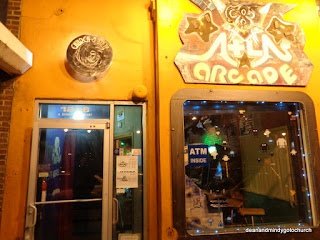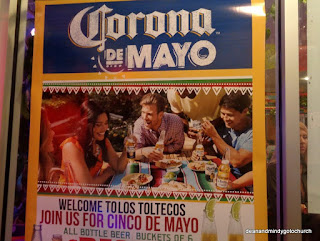Faithful readers of Dean and Mindy walk
into a bar (are there such people?) know there is a running debate here about
whether certain places are bars or restaurants (using the words
"grill" and "pub" can add to the confusion). This week
there's a different debate. Is Hutch's Pub a bar or a pool hall? (I think we
can quite certain say Hutch's is not a restaurant, even though it's possible to
order food at the bar, because they post kitchen hours which differ from the
bar hours. Since there are hours that Hutch's open and food is not served, we can
safely rule out restaurant; even though their wings are quite tasty.) But might
it be a pool hall?
Besides the pool team schedules, APA
(American Poolplayers Association, not the American Psychological Association) schedule,
and, of course, the pool tables, there were other billiard decorations to be
found. I particularly liked the pool cue with the scope and the
"break" mirror.
As nearly as we could figure, almost
all the customers there that night were there to play pool. Only one of the two
pool tables was in use, though, apparently because only two teams were playing
that night. Some nights there are four teams, and on those nights both tables
are in use. But there is only league pool play on Wednesday and Thursday
nights. So five nights a week, it's clearly not a pool hall. No doubt about it,
Hutch's Pub is a bar, in any alcohol-related definition of the word.
We sat at the bar, and Mindy ordered
an Angry Orchard cider. I asked for a bourbon and water and let Kaitlyn the
bartender make the call on the brand (Jim Beam), and accepted when she offered ice and lemon. Uriah Heep was playing loudly,
and a guy in the bar called out, "I seen these guys in concert, man! First
freakin' Scorpion and now this! Who's programing the jukebox? I saw them when I
was 17 and I was so f...ed up!" (Other oldies heard through the night
included John Mellencamp's "Pink Houses" and "Tuff Enuff"
by the Fabulous Thunderbirds.)
I talked to a couple seated near us,
Jeanie and Walter. Walter is from Switzerland, Jeanie is American; they met
online. In the four years they've been together, they've traveled the States
extensively and been to Switzerland five times. They don't only shoot pool -- Walter
is active in a Swiss Shooting Club in the area.
I asked them our two standard
questions, "What makes for a good bar?" and "What makes for a
good church?" For a bar, Jeannie said it was a matter of the friendly
people. She said the people at Hutch's can be rowdy, but they aren't violent.
She comes alone to the place every other week to play pool and always feels
safe. Walter said it's a matter of the general atmosphere. He doesn't like big
bars, but prefers a place where you can get to know people. They both liked the
fact that there was a consistent crowd at Hutch's. They said we'd just missed
Tom, the owner, a man who knows his customers. As for what makes for a good
church, Jeanie said, "No priest, no minister, no pastor." She
described herself as a "recovering Catholic." She said they were
married in a Swedenborgian church in Wilmington, The Church of the Holy City, about
which they were quite enthusiastic.
Mindy talked with Kaitlyn, our
bartender. She's been working at Hutch's for nine months, and when Mindy asked
what made a good bar, Kaitlyn said good
drinks and friendly people. "We call this a Cheers bar. Everyone knows
everybody's name. I love my little Cheers bar." As for what makes for a
good church, she said, "I really feel I've got to go with friendly people
again."
Mindy talked to another woman, Marty,
who wasn't there to play pool. She said that in a bar she looks for "a
good drink with decent people; it has to be safe." When asked about a good church, she told
Mindy about her own church as well as a few other historic churches in the area.
She's a member of Christiana Presbyterian Church, which she described as being
a community base. "It's not a big church" she said, "but it's
been around since the Revolution." She talked about the church's mission
trips, women's groups, and VBS. "We're a regular mainline Presbyterian
Church."
I asked one other patron, Dave, our
two questions. He said he's been coming to this bar for 8 to 10 years. He
values people in a bar; the staff and the customers. He likes being at a place
where the people are "genuine" and won't stay if they aren't. The
staff needs to be attentive to the needs of the customers. Like everyone I
spoke to, he was highly complementary of Kaitlyn. (As we were talking, she was
standing nearby and said, "You better say good things about me, I'm
serving you drinks.") Dave does go to church (The Love of Christ Church),
and he values a pastor who relates to people. If the pastor in his sermons
"hits home," it's a good church, Dave said.
Before leaving, we needed to watch
Jeanie finish her game. She sunk the nine ball, winning her game. We
congratulated her and said goodbye to folks, including the people smoking
outside who we'd met inside. We were glad we went to Hutch's. It's a place for
a good game of pool and it has a good pool of people.















































